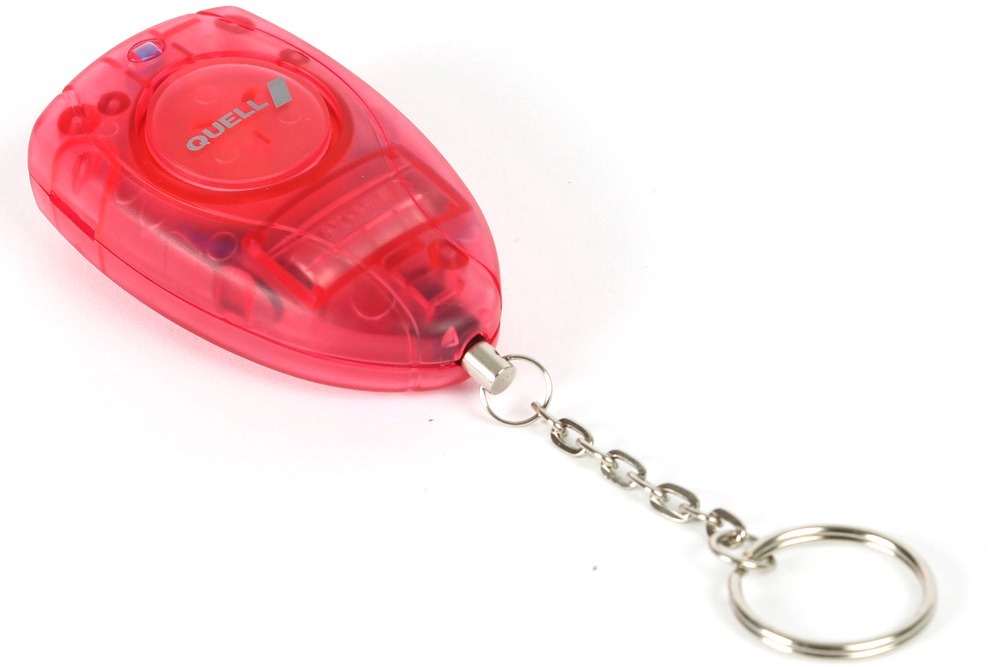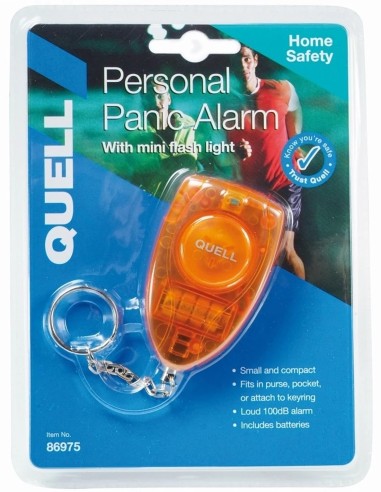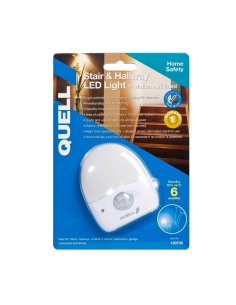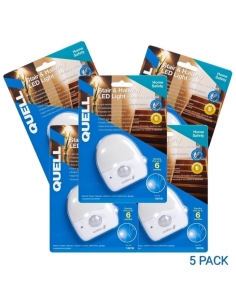Personal Alarm Quell with Mini Flash Light SUPER LOUD Siren Portable
Quell Personal Alarm – be heard, be seen. Compact safety keyring alarm with 100 dB siren and bright LED torch. Pull-pin activation draws instant attention in an emergency; also called a panic/duress alarm. Clip to keys, bag or lanyard for daily carry.
Ideal for walkers, commuters, students, shift workers and seniors. Trusted Quell quality with fast Australia-wide shipping.
- Specs: 100 dB siren; LED torch; keyring; LR44 batteries (included); IPX4 splash-resistant.
Buy this personal safety alarm today for peace of mind.
Quell Personal Alarm | 100 dB Keyring Safety Alarm with LED Torch

Stay safer on the go with the Quell Personal Alarm—a compact keyring alarm that unleashes a piercing 100 dB siren at the pull of a pin and includes a bright LED torch for low-light moments. Clip it to your keys, bag or lanyard and carry instant attention-grabbing power wherever you are. Lightweight, simple to operate under stress and ready for daily use, it’s ideal for walkers, commuters, students, shift workers, travellers and seniors. Batteries are included, and the splash-resistant build is made for real-world Aussie conditions. (Always call 000 in an emergency.)
Key Benefits
- Loud 100 dB siren to draw attention and deter threats.
- Pull-pin activation—easy under stress, quick to reset.
- LED torch—find keys, paths and door locks at night.
- Portable & discreet—keyring-ready, lightweight housing; splash-resistant.
- Ready to use—LR44 batteries included.
How It Works
- Carry: Keep it where your dominant hand can reach—keys, bag strap, belt loop or lanyard.
- Activate: Firmly pull the pin/chain to trigger the 100 dB siren.
- Illuminate: Use the built-in LED torch when visibility is poor.
- Reset: Re-insert the pin to silence and ready it for next time.
10 Real-World Scenarios (When & How to Use It)
1) Early-Morning Walks & Runs
Before sunrise, paths are quiet and lighting can be patchy. Keep the alarm on your keys or clipped to your waistband. If someone approaches and you feel uneasy, move toward light or other people, grip the unit and prepare the pin. A firm pull produces a sharp, unexpected blast that draws attention and can interrupt unwanted approaches. Reset once you’re safe and continue your route with confidence.
2) Night-Shift Car Parks
Finishing late in hospitality, healthcare or retail often means walking to the car alone. Use the torch to scan around the vehicle and the back seat before unlocking. If someone follows or loiters, head towards cameras or a staffed area and pull the pin if you feel threatened. The siren cuts through ambient noise, alerts nearby staff and discourages opportunists.
3) Seniors Living Independently
For older Australians, simple activation is crucial. Keep one alarm on a bedside table and another near the front door or on a walker frame. In a fall or medical event, triggering the siren can alert neighbours or carers while you reach a phone to dial 000. The pull-pin is easier than tiny buttons, and the torch reduces night-time stumbling.
4) Public Transport & Interchanges
Stations and busways can feel crowded yet isolating. Clip the alarm to your bag strap where your thumb can reach it quickly. If there’s aggressive behaviour or a bag-snatch attempt, activate the siren to create an immediate focal point and attract bystander support. The torch helps with dim platforms and reading timetables after dark.
5) School & Uni Commutes
Students crossing campus or car parks benefit from a visible, simple deterrent. Practise the motion of pulling and resetting so it’s muscle memory. If a corridor or lift interaction becomes uncomfortable, keep the alarm in hand and move toward crowds; use the siren to buy time to step away or call security.
6) Rideshare & Taxi Awareness
Before you hop in, confirm the rego and sit where the door is clear. If a route change feels wrong or a stop looks unsafe, ask to exit at a lit area while holding the pin ready. If you feel at risk, pull to alert passers-by. The torch helps with house numbers, gates and keys so you’re not lingering on the kerb.
7) Travel, Hotels & Hostels
In unfamiliar streets, keep the alarm on your daypack. Inside accommodation, use the torch to navigate corridors quietly at night. If an interaction becomes uncomfortable, trigger the alarm to bring staff attention fast. Keep a spare unit in luggage so there’s always one ready for day trips.
8) Hiking, Camping & Outdoor Days
Bush settings can put you out of sight but within earshot of others. If you’re injured or separated, use the siren as a persistent audio beacon while you stay put. The torch assists with tent zips and gear after dark. For remote trips, pair with a whistle or PLB—this alarm complements, not replaces, dedicated emergency gear.
9) Retail, Real-Estate & Community Roles
Anyone who meets the public alone—open homes, deliveries, community visits—can keep the alarm clipped near the hip or name badge. If a conversation turns hostile, step to a doorway or visibility point and pull the pin. The sudden volume alerts colleagues and helps de-escalate long enough to close a door or call for help.
10) Roadside Breakdowns & Car Parks
A flat tyre in the rain or an underground car park with patchy reception isn’t ideal. Use the torch to check tyres and read tools; keep the alarm ready while you wait for assistance. If someone approaches aggressively, trigger the siren to attract attention from attendants or other drivers and discourage interference.
Who It’s For
- Walkers, runners and commuters wanting a simple personal safety alarm.
- Students and shift workers crossing car parks at night.
- Seniors or anyone living alone who wants a fast way to call attention.
- Retail, real-estate and community workers in public-facing roles.
- Travellers, hikers and festival-goers needing a compact deterrent and torch.
What’s in the Pack
- Quell Personal Alarm with integrated LED torch
- Keyring/chain and pre-installed LR44 batteries
- Quick-start instructions
Important: This product is a personal alert/deterrence device. It does not dial emergency services or track your location. Always call 000 in an emergency. Specifications and colours may vary slightly by batch. Also known as a personal alarm, keyring alarm, panic alarm, duress alarm, attack alarm—the purpose is the same: attract attention fast.
In stock with fast Australia-wide shipping. Add one to your keys, bag or lanyard today for everyday peace of mind.
Personal Safety in Australia: Practical Tips, Tools & Where to Get Help
Feeling safe shouldn’t be a luxury. Whether you live in a regional town or a busy city, most Australians move through public spaces every day—walking the dog before sunrise, catching a late train after work, heading home from hospitality shifts, or travelling interstate for study. A little preparation can go a long way. This guide brings together practical, common-sense habits, useful tools like personal safety alarms, and trusted support services across Australia so you can plan ahead, respond calmly, and get help faster if something goes wrong.
Build Simple Daily Habits
Good safety practice starts with small routines that reduce risk without creating fear. Walk with purpose and stay aware of what’s around you—earbuds down, eyes up. Whenever possible, choose well-lit routes on streets with foot traffic or CCTV; keep keys and phone easy to reach. If you’re out at night, tell a friend your plan and your ETA. On public transport, wait near other people or staff and sit where exits are clear. Trust your instincts: if a situation feels off, it usually is—change direction, step into a busy shop, or call someone while you move to a safer spot.
Use Smart Tools (They’re Simple & Effective)
Your phone is useful—maps, ride-share details, quick calls—but it can be slow to unlock or fumble with when stressed. That’s where a keyring personal alarm adds value: it’s small, visible, and deliberately loud. A sharp 100 dB siren attracts attention quickly, interrupts threatening behaviour, and helps bystanders locate you. The built-in torch is practical for finding door locks or navigating dark paths. Consider pairing it with a charged phone, a battery pack, and if you hike or work remotely, a whistle and a registered PLB (personal locator beacon). No single tool is a silver bullet; layered protection works best.
Plan for “What If” Moments
A little rehearsal helps you act quickly if something happens. Think through what you’d do if a stranger follows you, if a rideshare feels wrong, or if you lose reception in a car park. Keep your alarm in your dominant hand when entering lifts, walking to your car, or navigating unfamiliar streets at night. If you feel threatened, pull the pin and move toward people and light. If you witness someone else in trouble, call 000 immediately, describe the location clearly (street, shopfront, platform number), and if it’s safe, use direct but calm language: “Are you OK? Do you want me to call someone?”
Bystander Tips: Help Without Escalating
Most of us want to help but worry about making things worse. Remember the “three Ds”: Direct (speak up if it’s safe), Distract (change the focus—ask for directions, drop something, create a pause), and Delegate (get staff, security, or call the police). If someone triggers a personal alarm, look for them and ask what they need; stand nearby until help arrives. Don’t put yourself in harm’s way—creating witnesses and calling for help is valuable.
Important Numbers & Support (Australia-Wide)
- Emergency: 000 (Police, Fire, Ambulance) — if you or someone else is in immediate danger.
- Police (non-urgent): 131 444 — report incidents that aren’t life-threatening.
- Crime Stoppers: 1800 333 000 — anonymous crime information.
- 1800RESPECT: 1800 737 732 — national domestic, family & sexual violence counselling.
- Lifeline: 13 11 14 — crisis support & suicide prevention (24/7).
- Beyond Blue: 1300 22 4636 — mental health support.
- Kids Helpline: 1800 55 1800 — for young people aged 5–25.
- MensLine Australia: 1300 789 978 — phone & online counselling for men.
- Men’s Referral Service (No to Violence): 1300 766 491 — counselling & behaviour change support.
- eSafety Commissioner: guidance on online abuse, image-based abuse & reporting options.
Safety in Social Venues & Public Spaces
Many pubs, clubs and events support discrete help strategies (for example, asking staff for assistance using agreed phrases). If you feel unsafe, head to the bar or a staffed entry point and ask for help; most venues will intervene, arrange safe transport, or contact security. When travelling alone at night, choose licensed taxis or reputable rideshare services, check the number plate, and share your trip details with a friend. If a ride feels wrong, end it early in a busy, well-lit area and seek assistance.
Home, Strata & Community Settings
Personal safety also matters close to home. Keep entrances well lit and locks maintained, know your neighbours, and report suspicious activity to the building manager or police (non-urgent 131 444). In strata settings, encourage clear signage, working intercoms and CCTV in common areas. Community workers and real-estate agents should carry visible ID, set check-in times with colleagues, and have a simple alarm to hand when conducting inspections or visits.
For Young People, Students & New Arrivals
Starting university or moving cities is exciting—and sometimes overwhelming. Walk with friends at night, save key phone numbers, and learn the best-lit routes on campus. Keep a small personal alarm visible on your backpack; visibility itself can deter. International students should learn how to contact police and support services, and speak with campus security about escorts or safe-ride options after late classes.
Look After Your Mental Health
Feeling unsafe can take a toll. If you’ve had a frightening experience, talk to someone you trust or reach out to a helpline. Counselling can help you process events and rebuild confidence so safety tools feel empowering, not alarming. If anxiety is affecting your daily life, contact your GP for support options under a mental-health care plan.
The Bottom Line
Personal safety isn’t about living in fear—it’s about stacking small advantages in your favour. Choose well-lit paths, keep your phone charged, carry a compact personal alarm for quick attention, and know who to call if something goes wrong. With a little planning and the right tools, everyday Australians can feel more confident at dawn dog-walks, late shifts, festivals, campuses and in transit. If you or someone you know is in danger, call 000 immediately. For guidance, counselling or to talk things through, the national services above are ready 24/7.
What is a personal alarm?
- Personal alarms are small devices carried by an individual to alert bystanders of a pending situation. They contain a very loud siren that can be heard for a very long distance. These Keyring alarms allow you to feel safe while walking or being alone.
Who buys this product?
- Anyone who is walking alone or needs a loud alarm to scare off would be offenders.
Does this product have a torch?
- Yes this has a simple "press button" to activate the in built torch. The torch is bright enough to see a foot path for example during the night OR to see the door to put your key in.
How do you activate the alarm?
- The Alarm/Siren is activated by simply pulling the chain and separating it from the main unit. The siren will remain activated until the chain is inserted back into the unit.
How long will the batteries last?
- This is very much dependant on the use of the torch, however the torch will last for many hours and if the torch is only used occasionally, then there is no reason why you could not get over 2 years on the batteries.
- The batteries are replaceable using standard LR44 or A76 batteries.
Are Personal Alarms worth it?
- If you are someone that is walking alone, or someone who is vulnerable, then this Personal Alarm can be activated to draw attention to you. The personal alarm is not a guaranteed protection device however common sense would say it is better than not having one.
Is Quell a good brand?
- We have been selling Quell Personal Alarms for over 10 years to many different organisations, we cannot remember the last time we have ever had any unit back or claimed under warranty. The product is made exceptionally well unlike other brands on the market. They are packaged extremely well, and look good as an accessory.
Who are some of the customers who purchase the Quell Personal Alarm?
- Night Shift Workers
- NDIS (National Disability Service) for their staff and people who they care for.
- The Elderly and people in nursing homes.
- Young girls who are vulnerable at night
- People who walk alone
What are some of the names people use to find this alarm?
- Quell Personal Alarm
- Quell Personal Panic Alarm
- Personal Panic Alarm
- Hand Alarm
- Personal Duress Alarm
- Personal Alarm
- Panic Alarm for the Elderly
- Personal Alarm Systems for Seniors
- Personal Attack Alarm Australia
- Lone Worker Safety Alarm
- Discreet Safety Alarms
- Personal Mobile Alarms
- Alarm with Light



































